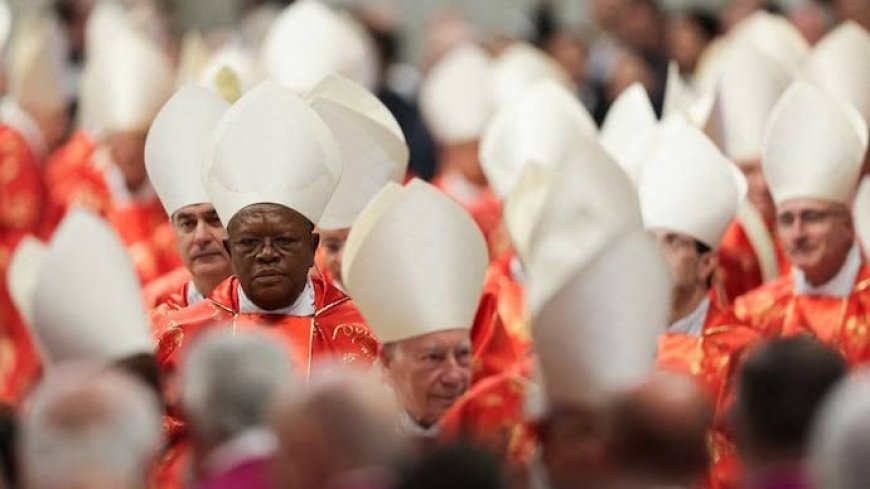Vatican Alters Birth Records for Two African Cardinals Ahead of Conclave

By Jesus Mesa
Politics Reporter
The Vatican has updated the ages of two African cardinals—John Njue of Kenya and Philippe Ouédraogo of Burkina Faso—effectively making both eligible to vote in the upcoming papal conclave despite previously being considered too old.
The change appeared in the 2025 edition of the Vatican's Annuario Pontificio, the authoritative yearbook of the Holy See.
Why It Matters
Following the death of Pope Francis on April 21, preparations for the conclave are well underway. The rare adjustment has expanded the number of voting cardinals to 135, amplifying African representation in the selection of the next leader of the Roman Catholic Church—a shift that could better reflect the Church's growing base in the Global South.
Papal Conclave
Africans
The Vatican updated the ages of John Njue of Kenya and Philippe Ouédraogo of Burkina Faso—effectively making both eligible to vote in the upcoming papal conclave despite previously being considered too old.
Since the reforms of Pope Paul VI in 1970, the rule disqualifying cardinals over 80 from voting in papal elections has shaped the balance of power inside the conclave. The sudden revision of birthdates shortly before a conclave alters that balance—especially by adding two senior prelates from Africa, a region that has seen exponential Catholic growth but limited influence in papal elections.
What to Know
The corrections alter previously accepted records that listed both Njue and Ouédraogo as born before 1945, which would have made them too old to vote under Church law. Their newly listed birth years—1946 and 1947, respectively—bring them under the canonical age limit of 80 for papal electors.
Concerns have been raised within Catholic and media circles about whether retroactive alterations—particularly for electors from regions with less formal civil documentation systems—might be seen as political manipulation.
"Not all countries enjoy the same quality of registry offices," explained Holy See Press Office director Matteo Bruni to reporters on Tuesday, and the initial statements on the date of birth "have been changed to a valid document."
However, despite the change, only Ouédraogo will participate in the voting. Njue, 79, will miss the conclave due to ill health, according to a statement from Kenya's Archdiocese of Nairobi. Earlier confusion had suggested he had not been invited, but officials have since clarified that he was invited but had to decline due to medical reasons.
"Although [the cardinal] is eligible to participate and was officially invited... owing to his current health condition [he] will be unable to travel to Rome," a statement signed by Archbishop Philip Anyolo said.
Njue, who retired in 2021, is now one of only two eligible cardinals not participating in the conclave—the other being Cardinal Antonio Cañizares of Spain—bringing the total number of votes to 133, most of them reportedly handpicked by Francis, according to Vatican insiders.
Vatican
Cardinal Pierbattista Pizzaballa arrives in the New Hall of the Synod at the Vatican, Tuesday, May 6, 2025, the last time before the start of the conclave starting in the afternoon of Wenesday, May 7,... More AP
The next pope will face a Church shaped by Francis's appointments and reforms. His tenure saw major structural changes, including the decentralization of the Vatican's power and the appointment of more non-European cardinals than any of his predecessors.
_How the Next Pope Is Chosen_
The election of a pope follows centuries-old Vatican traditions. The College of Cardinals will vote in secret ballots inside the Sistine Chapel. A two-thirds majority is required to elect a new pope. If no consensus is reached, additional rounds of voting will continue until a candidate emerges with the necessary support.
When a round of voting does not reach consensus, ballots are burned and the black smoke that appears from the Sistine Chapel chimney signals to those watching on television and in St. Peter's Square that the conclave continues.
When white smoke appears, a new pope has been chosen.
What People Are Saying
Ulrich Lehner, professor of theology at the University of Notre Dame, told Newsweek: "Pope Francis selected the majority of the cardinals who possess the right to vote. However, his approach to governance, characterized by unilateral decisions made without consultation with the College of Cardinals, has made it impossible to form interpersonal relationships among them."
Archbishop Philip Anyolo said in a statement: "Let us also continue to pray for the good health of His Eminence John Cardinal Njue."
What Happens Next
As the conclave to elect the next pope begins Wednesday at the Vatican, four candidates have emerged as clear favorites—Cardinals Pietro Parolin, Luis Antonio Tagle, Matteo Zuppi, and Pierbattista Pizzaballa.
They all have more than a 10 percent probability of being selected to replace Pope Francis as the head of the Catholic Church, according to the betting site Polymarket.
SOURCE,: NEWSWEEK













































